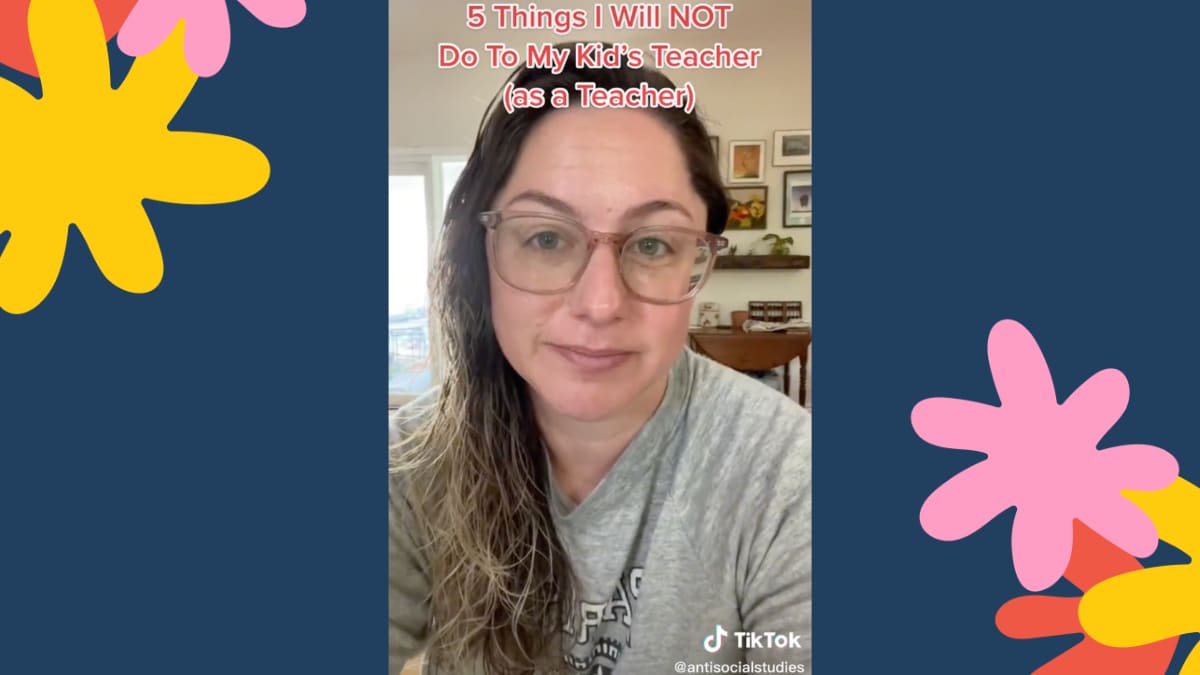It’s not easy being a teacher. Between wrangling classrooms full of dozens of students and trying to meet the needs of each individual child and family, teachers are constantly juggling a complex mix of problems, schedules and demands. But there are certain things parents can do to help make teachers’ lives easier. That’s why one teacher used TikTok to share a helpful list of teacher pet peeves that, she says, parents should avoid doing this school year.
Emily Glankler, a teacher and podcaster who goes by @antisocialstudies online, says her son is starting kindergarten soon, so she’s been thinking about her own experiences as a teacher. Ultimately, she decided to create a video list on TikTok of “five things I will never do to my kid’s teacher (as a teacher).”
Glankler’s list focuses on ways parents can not only support their child’s teacher, but also ways to make their jobs less stressful.
Her five tips for parents are:
- Don’t request a meeting or phone call without sharing the reason for the request.
- Don’t take up a teacher’s time by lingering or chatting too long at drop-off and pickup.
- Don’t automatically side with your child before you’ve spoken to the teacher when there’s an issue.
- Don’t bother teachers unless you genuinely need their help with something.
- Do give teacher appreciation gifts that teachers actually like and will use.
For those wondering about the last tip, Glankler even shared a follow-up post explaining exactly what kinds of gifts teachers prefer.
Teachers share their own dos and don’ts
Glankler’s post was met with mixed reactions from her followers. Many teachers applauded her honesty and shared their own pet peeves to add to the list.
“I taught for ten years,” one person writes. “Now I’m home, and I leave my kids’ teachers the heck alone!”
“Adding: Do not talk bad about teachers in front of your kids,” another person advises.
Other additions from teachers and school staff include:
- Don’t talk to school administrators without giving the teacher the chance to resolve an issue first.
- Don’t expect an immediate response if you email a teacher outside of school hours.
- Don’t bother the teacher with a question that the front desk staff at the school can answer.
- Don’t complain about the school supply list.
Is the teacher always right?
Not everyone found Glankler’s advice helpful. Some argue that it’s part of a teacher’s job to listen to parents no matter what.
“I disagree with most of these,” one person writes. “If you choose teacher as your profession, it’s your responsibility to be available and ready to discuss [problems]. Always believe the child.”
Others fired back at Glankler for saying they shouldn’t automatically believe their child over the teacher.
“As a counselor in public education, please always give your child the benefit of the doubt,” one person adds. “Don’t blindly, fully believe just the teacher.”
Glankler responded and clarified that kids should definitely be heard and taken seriously. “The idea is not walking into a meeting assuming what your kid said is the entire story,” she explains. “Gather information from all sides first.”
Why teachers need supportive parents more than ever
Glankler’s video is especially timely, given the difficulties many teachers face in the current educational climate. Major debates about everything from COVID procedures to curriculum have caused increasing frustration for teachers and school administrators. According to The Washington Post, schools around the country are in “crisis” as they face their biggest teacher shortages ever. In one survey by the National Education Association, 55% of teachers said they’re considering leaving their profession.
Glankler’s pet peeve list shows just how important interactions between parents and teachers can be. Everyone may not agree with her points, but her video is a powerful reminder that teachers are people, too, and small efforts by parents can go a long way toward creating a happier, more successful classroom environment for their kids.






